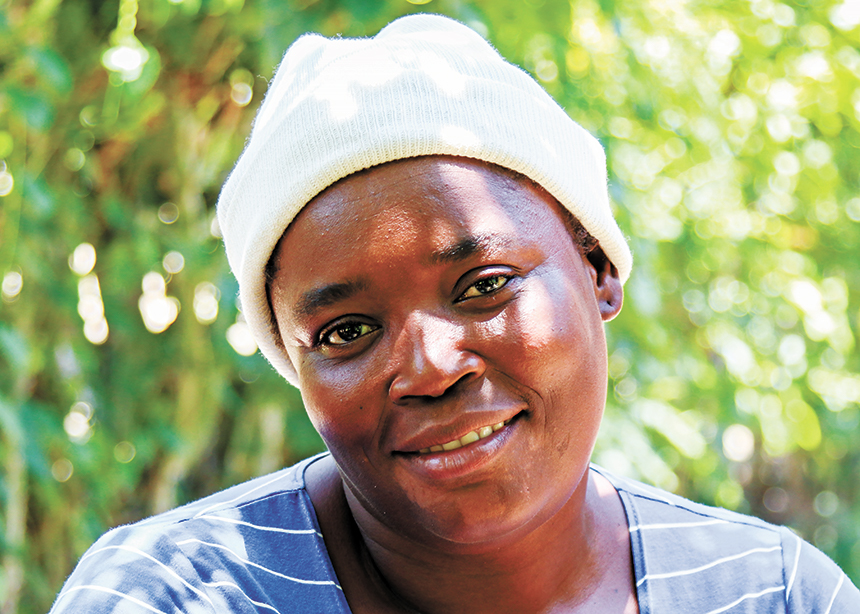“Close your eyes and imagine you are walking to your garden,” says Saint-Hilaire Olissaint, a community mental-health worker. His calm, soothing voice carries over the din of the nearby street market and the curious chatter of the children watching nearby.
“You open the gate and see the plantain leaves glistening with dew. The trees are heavy with ripe fruit and your plants are loaded with corn, beans and tomatoes ready to harvest. You can smell ripe guavas and wet earth from the rain last night, you can feel the hoe handle, gritty in your hand. You can hear your goats in the distance.”
As he talks, the woman to his right, his patient, is holding her chest tightly with one hand, her eyes pinched shut, smiling. Tears are running down her cheek. She is muttering “Thank you, Jesus” under her breath as he narrates each part of this guided visualization exercise.
Noel Derenis, a 57-year-old widow in the rural community of Lahoye, Haiti, a half-kilometre from the Dominican border, has major depression. Like many people with mental illness in Haiti, she suffered for years before being able to get the mental-health care she needed.
This visualization exercise is but one tool among many that MCC’s partner, Zanmi Lasante, the Haitian branch of the non-profit Partners in Health, uses to address mental-health needs.
Community mental-health workers like Saint-Hilare do initial screenings, refer patients to higher levels of care when it’s needed, provide regular followup and teach coping skills, like the visualization exercise. They also educate the community about mental health to reduce stigma.
People who need higher levels of care can get talk therapy from psychologists and social workers. Doctors provide medication, if needed, and manage the care of the most-complex patients. Last year, Zanmi Lasante’s mental health program worked with 2,210 patients.
“It all started when my husband got sick and died,” Derenis says. “We spent everything we had on medical care, and he still died. I was left with nothing, and I had four children to take care of. I had to take them out of school. We didn’t have enough food to eat. I was panicked. I couldn’t breathe. I couldn’t think. I began to see things and hear things that weren’t there.
“My children were suffering because of me, and I saw that,” she continues, “but this only gave me more shame and sadness. If I were not a Christian, if I didn’t have these four children to feed, I would have taken my life long ago.”
Untreated mental illness is a serious public health concern because it not only reduces the number of years a person is productive by as much as a third, it results in suffering and premature death, according to various studies.
Yet funding for mental-health care around the world makes up just 0.41 percent of total global health funding. While MCC is a relatively small funder, it spends an estimated 1 percent of all private philanthropic dollars on global mental health by supporting eight mental health projects in Afghanistan, Haiti, Lebanon, Nepal, Palestine, Syria and Tanzania.
According to most experts in the field, including the recent Lancet Commission on Global Mental Health and Sustainable Development, the majority of mental-health care available in economically poor countries like Haiti is of low quality and often consists of warehousing extremely sick patients in psychiatric hospitals rather than providing effective treatment.
Zanmi Lasante’s model of mental-health care is based on the principle that the poorest people in Haiti deserve high-quality, effective, compassionate mental-health treatment. Whenever possible, care is brought to people’s homes and communities, to make it accessible to even the most vulnerable and remote people.
“I am getting help now,” says Derenis, smiling shyly at Saint-Hilaire. “I still have times of sadness, and my economic situation is still so difficult. Sometimes I am overwhelmed by all I cannot do for my children. But I get counselling now and I have medication that helps me hang on to hope. I have energy to love and take care of my kids. I have energy to work and clean and leave my room. I am much better, thanks to God.”
Another participant from Lahoye, Guerres Lucien, says, “When I could no longer work, couldn’t leave my house or care for my children, my family called me lazy, stupid and crazy. It’s by God’s grace that I lived long enough to get this help and come to know that I could heal, and that it wasn’t my fault that I suffered like this. I’m so thankful I don’t live like that anymore.”
Paul Shetler Fast is serving as MCC’s global health coordinator and is based in Haiti.









Leave a Reply
You must be logged in to post a comment.